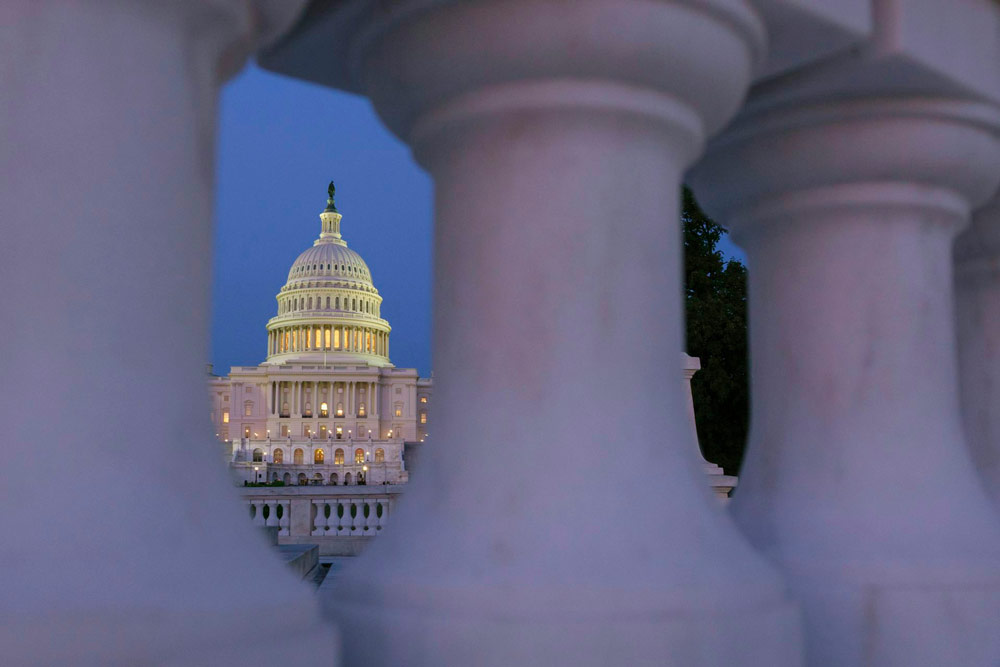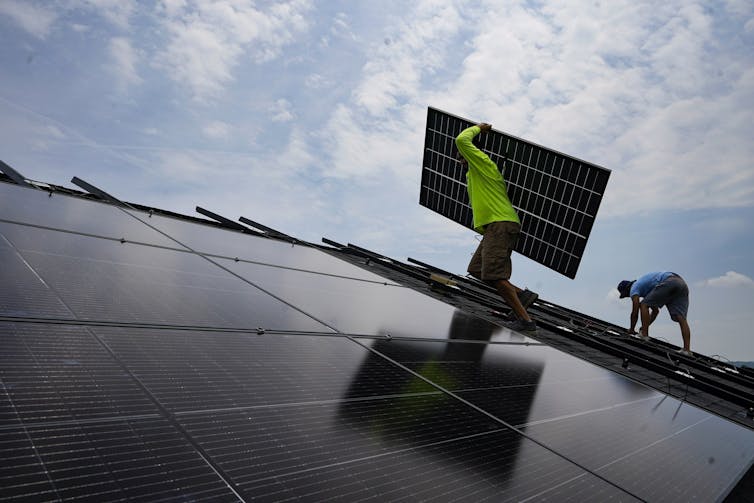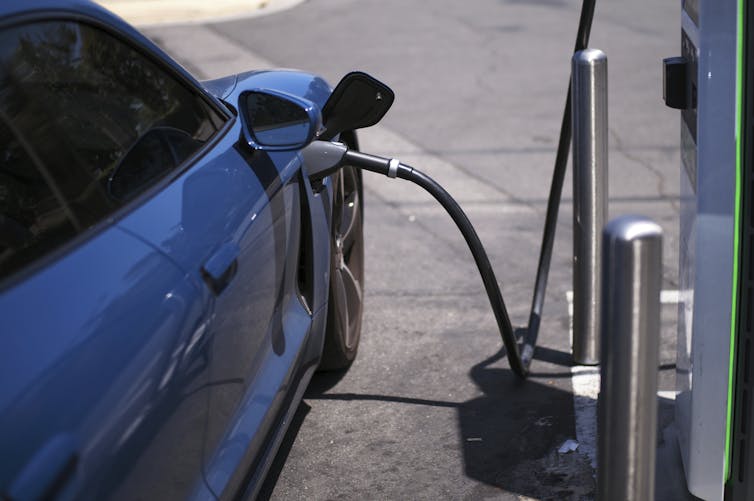
By Daniel Cohan
When congressional Republicans decided to cut some Biden-era energy subsidies to help fund their One Big Beautiful Bill Act, they could have pruned wasteful subsidies while sparing the rest. Instead, they did the reverse. Americans will pay the price with higher costs for dirtier energy.
The nearly 900-page bill that President Donald Trump signed on July 4, 2025, slashes incentives for wind and solar energy, batteries, electric cars and home efficiency while expanding subsidies for fossil fuels and biofuels. That will leave Americans burning more fossil fuels despite strong public and scientific support for shifting to renewable energy.
As an environmental engineering professor who studies ways to confront climate change, I think it is important to distinguish which energy technologies could rapidly cut emissions or need a financial boost to become viable from those that are already profitable but harm the environment. Unfortunately, the Republican bill favors the latter while stifling the former.

AP Photo/Matthew Brown
Cuts to renewable electricity
Wind and solar power, often paired with batteries, provide over 90% of the new electricity added nationally and around the world in recent years. Natural gas turbines are in short supply, and there are long lead times to build nuclear power plants. Wind and solar energy projects – with batteries to store excess power until it’s needed – offer the fastest way to satisfy growing demand for power. Recent technological breakthroughs put geothermal power on the verge of rapid growth.
However, the One Big Beautiful Bill Act rescinds billions of dollars that the Inflation Reduction Act, enacted in 2022, devoted to boosting domestic manufacturing and deployments of renewable energy and batteries.
It accelerates the phaseout of tax credits for factories that manufacture equipment needed for renewable energy and electric vehicles. That would disrupt the boom in domestic manufacturing projects that had been stimulated by the Inflation Reduction Act.
Efforts to build new wind and solar farms will be hit even harder. To receive any tax credits, those projects will need to commence construction by mid-2026 or come online by the end of 2027. The act preserves a slower timeline for phasing out subsidies for nuclear, geothermal and hydrogen projects, which take far longer to build than wind and solar farms.
However, even projects that could be built soon enough will struggle to comply with the bill’s restrictions on using Chinese-made components. Tax law experts have called those provisions “unworkable,” since some Chinese materials may be necessary even for projects built with as much domestic content as possible. For example, even American-made solar panels may rely on components sourced from China or Chinese-owned companies.
Princeton University professor Jesse Jenkins estimates that the bill will mean wind and solar power generate 820 fewer terawatt-hours in 2035 than under previous policies. That’s more power than all U.S. coal-fired power plants generated in 2023.
That’s why BloombergNEF, an energy research firm, called the bill a “nightmare scenario” for clean energy proponents.
However, one person’s nightmare may be another man’s dream. “We’re constraining the hell out of wind and solar, which is good,” said U.S. Rep. Chip Roy, a Texas Republican who is backed by the oil and gas industry.

AP Photo/Michael Conroy
Electric cars and efficiency
Cuts fall even harder on Americans who are trying to reduce their carbon footprints and energy costs. The quickest phaseout comes for tax credits for electric vehicles, which will end on Sept. 30, 2025. And since the bill eliminates fines on car companies that fail to meet fuel economy standards, other new cars are likely to guzzle more gas.
Tax credits for home efficiency improvements such as heat pumps, efficient windows and energy audits will end at the end of 2025. Homeowners will also lose tax credits for installing solar panels at the end of the year, seven years earlier than under the previous law.
The bill also rescinds funding that would have helped cut diesel emissions and finance clean energy projects in underserved communities.

AP Photo/Jae C. Hong
Support for biofuels and fossil fuels
Biofuels and fossil fuels fared far better under the bill. Tens of billions of dollars will be spent to extend tax credits for biofuels such as ethanol and biodiesel.
Food-based biofuels do little good for the climate because growing, harvesting and processing crops requires fertilizers, pesticides and fuel. The bill would allow forests to be cut to make room for crops because it directs agencies to ignore the effects of biofuels on land use.
Meanwhile, the bill opens more federal lands and waters to leasing for oil and gas drilling and coal mining. It also slashes the royalties that companies pay to the federal government for fuels extracted from publicly owned land. And a new tax credit will subsidize metallurgical coal, which is mainly exported to steelmakers overseas.
The bill also increases subsidies for using captured carbon dioxide to extract more oil and gas from the ground. That makes it less likely that captured emissions will only be sequestered to combat climate change.
Summing it up
With fewer efficiency improvements, fewer electric vehicles and less clean power on the grid, Princeton’s Jenkins projects that the law will increase household energy costs by over $280 per year by 2035 above what they would have been without the bill. The extra fossil fuel-burning will negate 470 million tons of anticipated emissions reductions that year, a 7% bump.
The bill will also leave America’s clean energy transition further behind China, which is deploying more solar and wind power and electric vehicles than the rest of the world combined.
No one expected President Joe Biden’s Inflation Reduction Act to escape unscathed with Republicans in the White House and dominating both houses of Congress, even though many of its projects were in Republican-voting districts. Still, pairing cuts to clean energy with support for fossil fuels makes Trump’s bill uniquely harmful to the world’s climate and to Americans’ wallets.
![]()
Daniel Cohan is Professor of Civil and Environmental Engineering at Rice University.





























JimboXYZ says
Hmmmm, gas prices here are under $ 3/gallon for 87 octane and that’s quite unaffordable even for too many. None of us have ever paid what the Biden subsidies for clean energy were doing for us for those 4 miserable years. Anyone pay $ 4/gallon for 87 octane in the last 6 months of Trump. Prices are lower for gasoline than they were under Biden-Harris in an election year trying to get votes ? The truth of it all. Nothing Biden did resulted in lower prices of affordable anything. And emissions, the human race polluted at a record level, only to be bettered as the population of planet Earth continues to grow.
While the environment is the Rice University professeor’s big concern. crops feed people, especially the people that the Democrats are giving away to 3rd world nations. Those Biden-Harris subsidies weren’t improving the pollution from & inflation on fuel for planet Earth & anyone’s bank accounts.
Biden’s inflation Reduction Act was smoke & mirrors. Inflation continued and nobody that could afford an EV got any kind of Inflation Reduction. Too many never qualified for Biden’s Inflation Reduction benefits. And if they did they spent 10’s & 100’s of thousands for EV transportation & Solar Energy homes. Actually, those folks got screwed by Biden, screwed by Trump. Screwed is what they got. They paid more for the incentives & subsidies than they were worth. Will take decades to recoup those, even had any subsidies, not been rescinded ? If solar panels cost $ 20K, how many tears to a decade is that for a breakeven point ? And if one is leasing that solar energy system, will the solar company be in business to honor the warrant. Each one of them has a proprietary solar system that once you lock in for that system. You’d have to replace it yourself to be free of the contractual & legal messes the contractor’s are trying to align as their gold mine of solar energy.
This professor needs to stick to engineering, he certainly isn’t an expert that is qualified to be rating economic policies. He’s out to lunch on this topic & the economics alone disprove his position. He must be part of this group that was getting a subsidy to spin the dis-/mis-information of “Biden Good, Trump Bad”.
Pogo says
@Daniel Cohan
All true.
Paraphrasing King Théoden of Rohan during the Battle of Helm’s Deep in the LOTR trilogy: So much death. What can men do against such reckless hate, greed, and suicidal stupidity? The wealth, power, and the inertia inherent in its giant scale, wielded by resource extraction businesses, and all that derives from that, is steadily and implacably rolling shut the door of our tomb.
And so ended the age of mankind.
laurel says
Big oil needs more of our money. Go ahead, Trumplicans, explain why. He’s imploding our country with your blessings.
Jake from state farm says
Oh, looks like I totally missed that article FL shared about the “benefits” of the bill. Naturally, the media isn’t exactly rushing to highlight any of that—because, of course, it’s the end of the world. Didn’t WWIII already start? Anyway, as Jimb0XYZ pointed out, Biden’s Inflation Reduction Act was a total disaster. And for anyone still clinging to the idea that it was a win, just remember, you thought Biden was at his best and competent. The BBB wasn’t perfect, sure, but let’s not forget the “good folks” in Congress had to grab their share too. But hey, the fact that they can’t even admit there were some “good parts” without lying through their teeth? Yeah, that pretty much says it all.
Lower Tax Rates:
Most middle-income families got a nice, if modest, tax cut thanks to lower rates across income brackets.
Doubled Standard Deduction:
Taxes got simpler, and many people saw a drop in taxable income. For instance, a married couple filing jointly saw their standard deduction jump from $12,700 to $24,000.
Increased Child Tax Credit:
The child tax credit doubled, going from $1,000 to $2,000 per child, with more families qualifying thanks to higher income thresholds (up to $400,000 for joint filers).
This was a huge win for working families with kids.
Higher AMT Thresholds:
The Alternative Minimum Tax (AMT) hit fewer middle- and upper-middle-income households, especially those in high-tax states.
20% Qualified Business Income (QBI) Deduction:
Sole proprietors, partnerships, LLCs, and S-corporations (the “pass-throughs”) could deduct up to 20% of their business income.
This was a major break for small businesses.
Full Expensing of Capital Investments:
Businesses could immediately deduct the full cost of certain equipment and property (through 2022), making it easier for small firms to invest and grow.
Lower Individual Rates Helped Pass-Throughs:
Since pass-through businesses are taxed through their owners’ personal income, the lower individual rates gave them an indirect boost.
Atwp says
Jimbo don’t forget about the social service slashes, the tax cuts for the rich white men. It is a bad bill. Almost everything Trump does is bad.